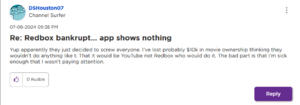Redbox
⚠️ Article status notice: This article has been marked as incomplete
This article needs additional work for its sourcing and verifiability to meet the wiki's Content Guidelines and be in line with our Mission Statement for comprehensive coverage of consumer protection issues.
This notice will be removed once sufficient documentation has been added to establish the systemic nature of these issues. Once you believe the article is ready to have its notice removed, please visit the Moderator's noticeboard, or the discord and post to the #appeals channel.
Learn more ▼
| Basic Information | |
|---|---|
| Release Year | 2002 |
| Product Type | Video rental and streaming services |
| In Production | No |
| Official Website | https://web.archive.org/web/20241001080426/https://www.redbox.com/ |
Redbox Automated Retail, LLC, was a company founded in 2002 which primarily focused on kiosks, often found in grocery stores or gas stations, where customers could rent DVDs or video games. Redbox also offered a streaming app, where customers could purchase and stream content. In June 2024, its parent company filed for bankruptcy, and the following month, the company was liquidated.[1]
Consumer impact summary
Incidents
Removal of purchased content (2024)
RedBox found itself bankrupt, largely due to mismanagement from executives and shut down all of its services.[2] This would not just include the RedBox kiosks, but also their streaming platform.
From the shutdown, all users who had purchased content could not download or view any content, including one Roku user who claims that they lost approximately $10,000 of media.[3]

RedBox did not redefine terms such as “own” or “purchase” in their terms of service like Sony. RedBox only limits in their terms of service how many devices purchased content can be downloaded to.
Broader implications
Since this content was purchased digitally and nothing is guaranteed through physical ownership, companies are able to revoke, or suddenly fail to provide legitimately purchased content.[4] Any consumer who bought content on RedBox, using legitimate avenues to view the content, are ultimately punished for viewing content the right way, which incentivizes illegal means of viewing content.
This issue is not limited to Redbox: a similar result may occur with any digital-media company that either goes bankrupt or does not honor terms such as “purchase” or “own”. Every large company that provides digital content engages, or has the capacity to engage, in revoking purchased content, which either were or were not defined in the terms of service.
References
- ↑ u/AzothHg (2024-07-07). "A Redbox Retrospective from an Employee". Reddit. Archived from the original on 2024-07-25. Retrieved 2025-04-10.
- ↑ Roettgers, Janko (2024-06-21). "Redbox missed a multimillion-dollar payment it couldn't afford to miss". The Verge. Archived from the original on 2025-04-04. Retrieved 2025-04-10.
- ↑ DSHouston07 (2024-07-06). "Re: Redbox bankrupt... app shows nothing". Roku Community. Archived from the original on 2025-01-26. Retrieved 2025-04-10.
{{cite web}}: CS1 maint: numeric names: authors list (link) - ↑ "Transaction Terms and Conditions". 2021-10-20. Archived from the original on 2024-09-27.
